 Petzlover
Petzlover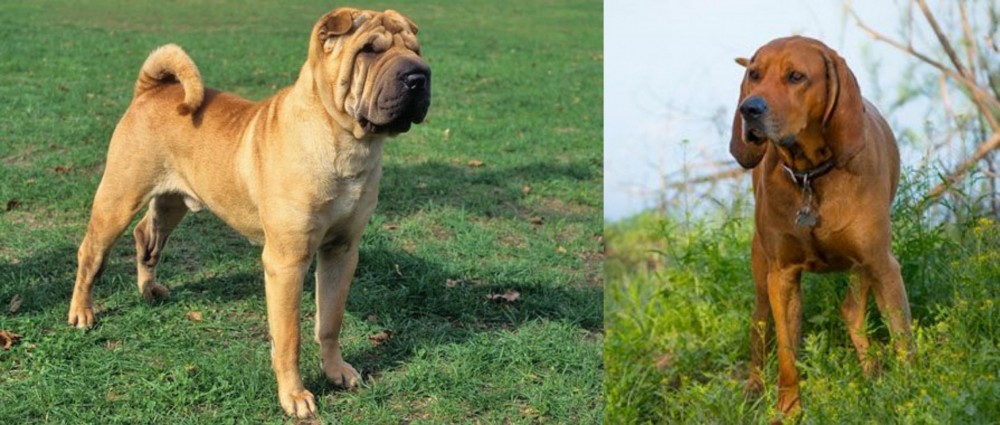 Chinese Shar Pei is originated from China but Redbone Coonhound is originated from United States. Chinese Shar Pei may grow 14 cm / 5 inches shorter than Redbone Coonhound. Chinese Shar Pei may weigh 7 kg / 15 pounds lesser than Redbone Coonhound. Chinese Shar Pei may live 3 years less than Redbone Coonhound. Chinese Shar Pei may have less litter size than Redbone Coonhound. Chinese Shar Pei requires Moderate Maintenance. But Redbone Coonhound requires Low Maintenance
Chinese Shar Pei is originated from China but Redbone Coonhound is originated from United States. Chinese Shar Pei may grow 14 cm / 5 inches shorter than Redbone Coonhound. Chinese Shar Pei may weigh 7 kg / 15 pounds lesser than Redbone Coonhound. Chinese Shar Pei may live 3 years less than Redbone Coonhound. Chinese Shar Pei may have less litter size than Redbone Coonhound. Chinese Shar Pei requires Moderate Maintenance. But Redbone Coonhound requires Low Maintenance
 The Chinese Shar-Pei is originally from Canton, China. The Shar-Pei has a blue-black tongue and many deep wrinkles. They have more wrinkles as a puppy than the adult dogs do. They are one of the rarest breeds in the world and are considered a basal breed – meaning their existence predates modern canines. Most canines are related to the gray wolf through genetic admixture. However, there are breeds like the Siberian Husky, the Greenland Dog, Finnish Spitz and the Shar Pei are all related to the Taymyr Wolk of North Asia through admixture. The Shar Pei is found throughout the centuries in Chinese artwork, especially found during the Han Dynasty, and are considered one of the most ancient of breeds on earth today. In this period, they were fighting dogs then became beloved pets. Today the Tibetans still use them as fighting dogs.
The Chinese Shar-Pei is originally from Canton, China. The Shar-Pei has a blue-black tongue and many deep wrinkles. They have more wrinkles as a puppy than the adult dogs do. They are one of the rarest breeds in the world and are considered a basal breed – meaning their existence predates modern canines. Most canines are related to the gray wolf through genetic admixture. However, there are breeds like the Siberian Husky, the Greenland Dog, Finnish Spitz and the Shar Pei are all related to the Taymyr Wolk of North Asia through admixture. The Shar Pei is found throughout the centuries in Chinese artwork, especially found during the Han Dynasty, and are considered one of the most ancient of breeds on earth today. In this period, they were fighting dogs then became beloved pets. Today the Tibetans still use them as fighting dogs.
Following the Communist Revolution, the Char Pei was almost extinct until Margo Law saved the breed. During this time, they smuggled around 200 dogs into the United States. All the dogs in the United States today come from those 200 dogs. They were accepted in 1992 into the AKC. The dogs served as trackers, hunters, ratters, guard dogs and herders.
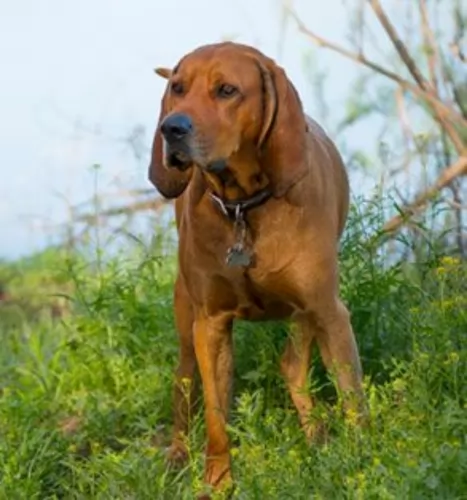 The Redbone Coonhound has always had a busy life hunting bear, deer and cougar. It is thought that this dog descends from from Bloodhounds, Foxhounds and Irish Hounds.
The Redbone Coonhound has always had a busy life hunting bear, deer and cougar. It is thought that this dog descends from from Bloodhounds, Foxhounds and Irish Hounds.
Hailing from America, this dog has been registered with the American Kennel Club since 2009.
It was during the 18th century that many European-type hunting dogs were imported to America. Over time, Southern hunters bred with stamina and this ultimately lead to the emergence of coonhounds.
 The Chines Sar Pei has what if known as a Horse-coat which is prickly, harsh, and rough to the touch on one direction and rough to touch on the other. Western Shar Peis can be Horse, Bearcoat and Brush. The Brush is longer and smoother while the Bear coat is rare and in-between the two. The Bearcoat is not accepted by the AKC while the other two types of coats are.
The Chines Sar Pei has what if known as a Horse-coat which is prickly, harsh, and rough to the touch on one direction and rough to touch on the other. Western Shar Peis can be Horse, Bearcoat and Brush. The Brush is longer and smoother while the Bear coat is rare and in-between the two. The Bearcoat is not accepted by the AKC while the other two types of coats are.
The Shar Pei should have a hippo shaped head, a black-purple tongue, black mouth, deep set almond shaped dark eyes, small ears and red coats. His profile is square, and his muzzle is full and wide. Most Shar Peis only have facial and neck wrinkles left as adults.
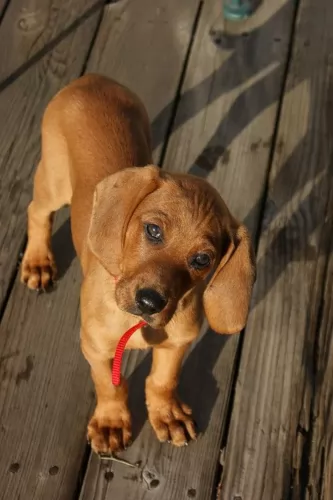 This beautiful, shiny red dog is medium-sized and stands at between 53 and 70cm at the shoulders and weighs between 20 and 32kg.
This beautiful, shiny red dog is medium-sized and stands at between 53 and 70cm at the shoulders and weighs between 20 and 32kg.
The dog’s coat is short and smooth with maybe just a tiny bit of white found around the feet and chest area. He is lean and muscular with strong, straight legs and a deep chest. The ears are floppy and the tail, traditionally docked, is often left long these days.
The paws are large and webbed and when the dog is excited, the tail is held high
The Redbone Coonhound is an affectionate dog who wants to please his owners. He just loves his human family and would be beside himself if he were locked outside day after day.
He is a social dog who should be allowed time indoors and out. They make splendid playmates for children too, and get along well with other animals in the house.
Because they’re independent and strong willed, he will need to be trained and socialized to ensure he is well mannered and obedient.
He is an active dog and will require a good bout of exercise. He is vocal, known for his baying type of bark, and training will keep this kind of baying under control. Training is also necessary as this dog is stubborn. He is intelligent enough to learn, and once trained, is gentle and calm.
 The Shar Pei must be socialized early to other people, children and animals if he is to be friendly with them. He is loyal to his people and instinctively wary of strangers. He will be completed devoted to his people, but he is reserved and independent. They can be aggressive and territorial if not socialized. They are stubborn, loving and loyal. They are dominant, brave and playful. They are great watch dogs. Keep them busy because they tend to think a lot independently and if they don’t have a job they may create one.
The Shar Pei must be socialized early to other people, children and animals if he is to be friendly with them. He is loyal to his people and instinctively wary of strangers. He will be completed devoted to his people, but he is reserved and independent. They can be aggressive and territorial if not socialized. They are stubborn, loving and loyal. They are dominant, brave and playful. They are great watch dogs. Keep them busy because they tend to think a lot independently and if they don’t have a job they may create one.
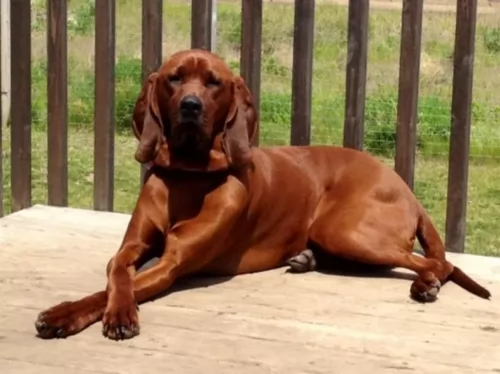 The Redbone loves the company of his human family. He is such a friendly dog,getting on well with everyone in the family, including the children and other pets.
The Redbone loves the company of his human family. He is such a friendly dog,getting on well with everyone in the family, including the children and other pets.
He is a hunting dog and always ready to be part of any activities his human family is involved in. He is gentle and easy going, and and having him in your life is guaranteed to bring in a lot of joy and sunshine.
 Because of the rushed and inexperienced breeding programs in the United States due to the popularity of the breed, there are many health issues in the North American version of the Shar Pei. Their life expectancy is generally under ten years. They are prone to:
Because of the rushed and inexperienced breeding programs in the United States due to the popularity of the breed, there are many health issues in the North American version of the Shar Pei. Their life expectancy is generally under ten years. They are prone to:
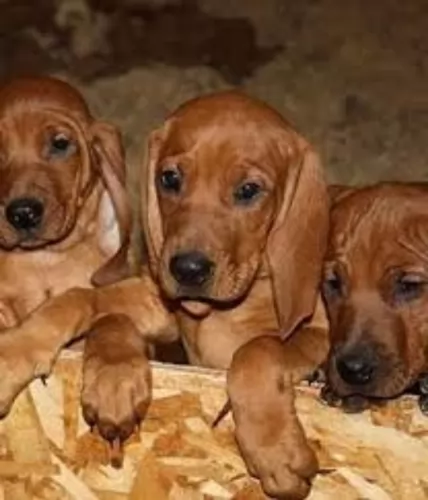 The Redbone Coonhound is generally a healthy breed that can reach 12, 13, 14 years of age if well cared for.
The Redbone Coonhound is generally a healthy breed that can reach 12, 13, 14 years of age if well cared for.
There are some common dog illnesses that this do can succumb to and which are worth knowing about as they affect so many dogs. These are cancer, bloat, skin allergies, ear infections and hip dysplasia.
If you notice that your active dog is subdued and lethargic, it is your responsibility to get your 4-legged child to the vet to be looked over.
 Feed a good quality dry dog food but do not overfeed. You should feed twice a day about one cup per six pounds for puppies. Adults should have two cups a day.
Feed a good quality dry dog food but do not overfeed. You should feed twice a day about one cup per six pounds for puppies. Adults should have two cups a day.
• Familial Shar Pei Fever – congenital and serious. This produces fevers that can last from 24 hours to three days. Swelling around the ankles is due to fluid retention.
• Entropion eye issues – eyelashes curl in and inflame the eye. Can cause blindness if not treated. Requires surgery.
Both as a puppy and an adult this is a pretty active dog. He needs at the very least to be walked every day or have a back yard to play in. They are sensitive to heat so bring them in when its really hot and don’t walk them in the heat. They love to play, are athletic and competitive. Try agility, tracking, rally and obedience trials.
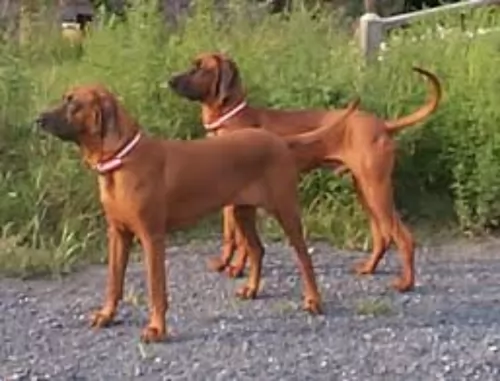 Hunting dogs such as the Redbone Coonhound will need a good deal of exercise to stay happy and healthy. The breed is best suited to the countryside or suburbs as opposed to city dwelling.
Hunting dogs such as the Redbone Coonhound will need a good deal of exercise to stay happy and healthy. The breed is best suited to the countryside or suburbs as opposed to city dwelling.
He won’t be content with just a walk every day but is the kind of dog that will want to be free from a leash and be running far and wide. When at home, involve him in some rope- and ball games.
The Redbone Coonhound isn’t going to be a dog that you have to fuss over. His short coat can be brushed twice a week to keep him looking beautifully shiny. When you brush him, make sure you check for any unusual lumps.
He has floppy ears, so look inside his ears for signs of redness and discharge. This could be an indication of an ear infection. Also check inside his mouth as he could have a rotting tooth which could be causing him a lot of pain and also be poisoning his body.
You want to ensure your beautiful Redbone Coonhound stands every chance to enjoy good health. Every dog owner should try to feed their dog the best food there is.
There are some good commercially manufactured foods on the market and these are wonderfully convenient to use for your dog. However, you want to provide him with some good homemade food too.
Dogs thrive on simplicity and consistency with their diets because then it prevents upset stomachs. Some home-cooked food such as boiled chicken, sweet potatoes, brown rice or pasta, carrots and spinach will be perfect for him.
Chop the food up finely and add it into the dry kibble once or twice a week. Raw meat can also be added in occasionally to promote good skin health. Make sure your pet is never without a constant supply of fresh, cool water.